I'm a father of three from Sydney, a Product Director and a Product Coach. I write about product management and run the Product Manager community.
Subscribe to receive digest emails (1 per month).
Info
Posts with Culture tag.
-
The way people in an organisation work together towards shared goals forms the core of its culture.
No shared goals? No shared culture. Just meetings with snacks. -
Game Over
I've seen senior leaders talk about empowerment until it means giving up control.
It's a problem if you want to build a product-led tech company.
Product teams get blocked when decisions pile up in ... Read more -
Love your job. But don't let it eat your life.
Work gives you purpose, adrenaline and praise. But it also wants more. More time. More mindshare. More of you. And if you're good at it, even more will be asked.
Your energy is finite. Use it well. Set a time to log off and don't cheat it. Book your workouts like meetings. Put family time on the calendar and guard it like an investor call. Say no to evening slacks. Skip the weekend emails. Make space for life outside your inbox.
Work hard. Just don't forget who you're doing it for. -
Love lunches with my team.
It's the sideways stories, the throwaway jokes, the unfiltered glimpses into who people really are.
You won't find those in meetings or sprint reviews. They happen over a sandwich. When the pressure's off. When people exhale.
Moments like that stay with you. -
Feedback delayed is feedback diluted.
After two weeks, the lesson goes cold. Details fade. Emotions disappear. What could've been a clear moment becomes a blur.
You try to explain what went wrong. Or what went right. But the context's gone. The person nods but doesn't feel it. They can't replay the moment in their head. The energy's moved on.
Feedback works when it's fast.
“In that meeting just now…” hits different than “Remember that thing two weeks ago?” One feels sharp. The other feels vague. Fresh feedback still has signal in it. Wait too long, and all you're left with is noise.
Don't hold it back. Say “great job” when the win is fresh.
If something was worth noticing, it's worth saying. Right now. Say it while the moment's still alive. -
To build great products you need to start asking great questions.
A simple question: “What problem are we solving?” will shift a team's mentality from execution to purpose.
And you can feel the exact moment when task-doers start to solve problems.
It's when they talk less about delivery and shipping features and ask more about business challenges, user pain points and the market. That's when they stop taking orders - and start shaping work.
Questions fuel curiosity and curiosity drives collaboration. Teams that ask deeply create better products. -
Set the Tone
Push others. Push yourself harder.
High standards beat perfection. They beat pressure. They are built on one thing - refusing to let average settle in.
Raise the Bar Around You
Call it out when your peers drift. Remind them what great looks like. Challenge your boss to reach higher. Hold the mirror up. Then hold yourself to an even sharper edge. Show them what it means to care - about the work, the craft, the outcome.
Build Incrementally
Pick one standard. Nail it. Then raise another. Layer it like muscle. Burnout comes from trying to change everything at once. Strength comes from building it piece by piece.
Quiet Consistency Wins
High standards are not loud. They are lived.
Patience wins. But only if you refuse to lower the bar while you wait.
Kindness Isn't Compliance
Most people confuse kindness with acceptance. Being kind doesn't mean tolerating mediocrity. Great teams grow because someone had the courage to raise the standard when it was easier to stay quiet.
Watch Out for “Good Enough”
Average is always looking for a way back in. It hides in phrases like “good enough” or “we'll fix it later.” Kill that thinking. Make high standards the default - not the exception.
Lead By Example
Start small. One line of copy. One slide. One handover doc. Show the difference. Set the bar by example. Then hold the line. Hold it when no one's watching. Hold it when others let it slip.
Make Quality Contagious
That's how you lead without the title. That's how you make quality contagious.
High standards are built in silence. But their results speak loud. -
The concept of a Trust Battery is that it typically starts at 50% and then every interaction charges or drains the trust battery.
It's interesting how, once you pass a certain percentage - let's say 80% (mind you, it's a bit abstract) - on the other person's Trust Battery, a shift happens. Walls drop. And suddenly the next level of collaboration unlocks.
Love these moments. -
Everyone talks about ‘hitting the ground running' after the Christmas break.
Let's be honest, no one feels like sprinting straight away at this time of the year.
Some are still catching up on sleep, recovering from all the desserts they've eaten, wrapping their heads around what day it is and trying not to fail one of their New Year's resolutions in the first week of the year.
Forcing yourself into work mode overnight is hard.
I'd rather ease into it. Spend the first day reconnecting with your team, archiving all the emails from last year and marking all Slack messages as read. Oh, that feels great.
By the second day, you're already feeling more in control.
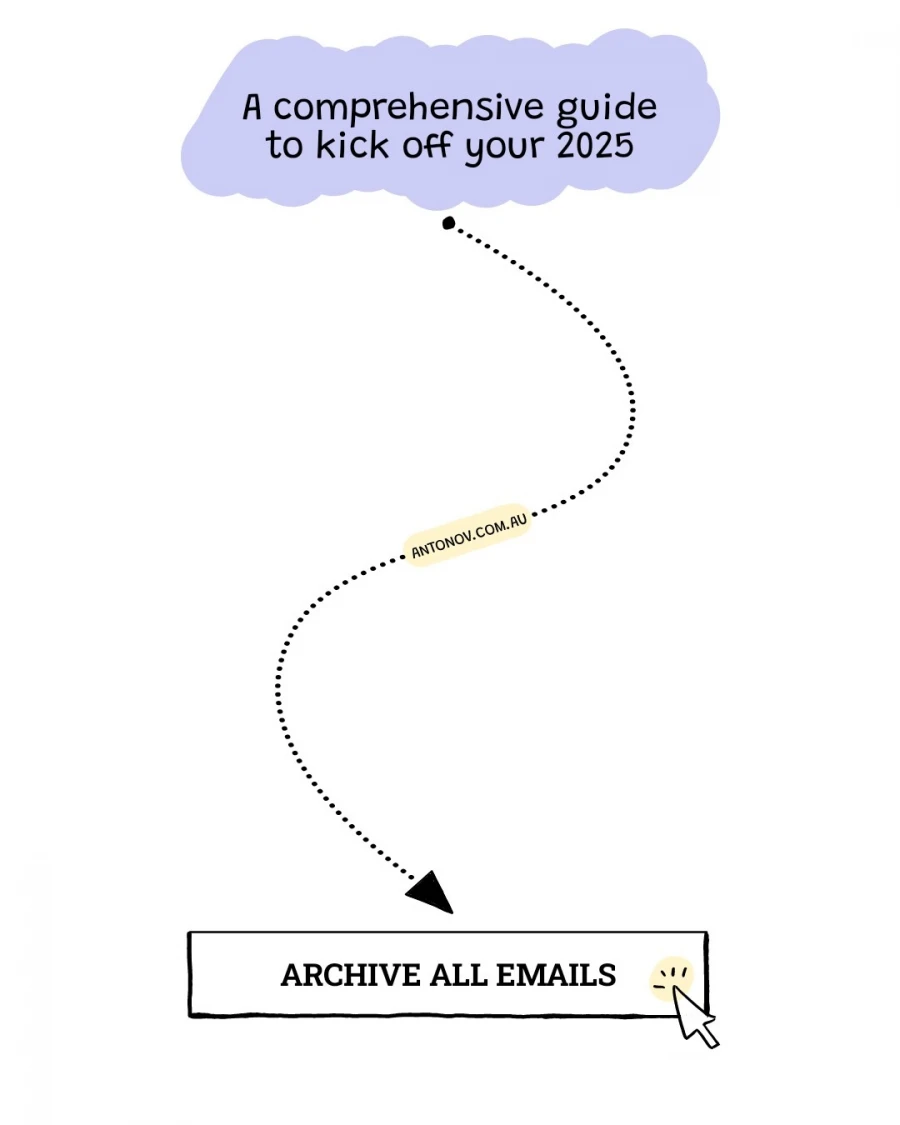
-
Uncertainty defines startup life.
Prioritising the right problems keeps you grounded. Communicating your vision aligns your team. Flexibility lets you navigate the unexpected. These habits aren't luxuries - they're survival skills.
Adaptability and focus turn uncertainty into opportunity. -
Hesitating to share a weird idea kills creativity. Fear of judgement silences potential brilliance.
Most unconventional ideas won't work. But the rare one that does can change everything. What seems absurd in one moment might solve a problem in another. Creativity thrives on the unexpected and bold ideas are the spark for breakthroughs.
By embracing the bizarre, teams unlock new possibilities. Instead of dismissing “stupid” ideas, explore them. Confidence to share fuels progress and every idea becomes a seed for innovation. -
Culture is shaped by the people within it. Sometimes, one person is all it takes to spark positive change.
An employee who offers genuine encouragement, lends a hand to solve a problem or suggests small but meaningful improvements can transform a team's energy - one action at a time.
This is the quiet yet powerful force of influence.
Amplify their voices.
Support them.
Elevate them.
Let their impact ripple further.
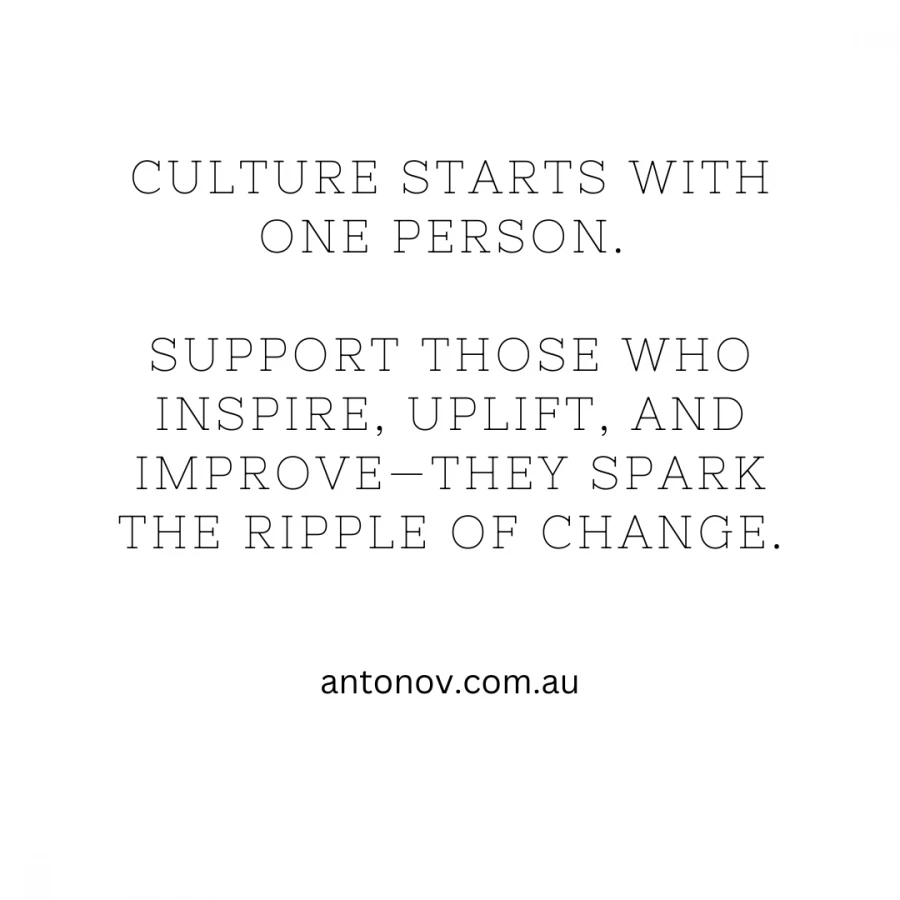
-
Silos.
Break them whenever you see them.
Silos keep teams from seeing the whole market picture.
Silos risk losing sight of the customer, prioritising internal goals and creating a fragmented experience.
Silos slow everything down - teams hold onto information, delaying solutions.
Silos leave teams blind to risks outside their scope. -
Expertise vs open-mindedness.
Sometimes it's hard to tell if someone's perspective is genuinely the best approach or if they're just anchored in familiar thinking. What if they don't even know what “awesome” could look like?
On the other hand, knowing when to hold your ground versus when to let things go can be even trickier. What if I don't know what “awesome” feels like and am just comfortable with my usual approach? -
Define who's making the call before a debate starts.
That person takes in everyone's input but in the end they own the final decision.
It cuts down on endless debates and helps the team align around a single direction - even if not everyone agrees at first.
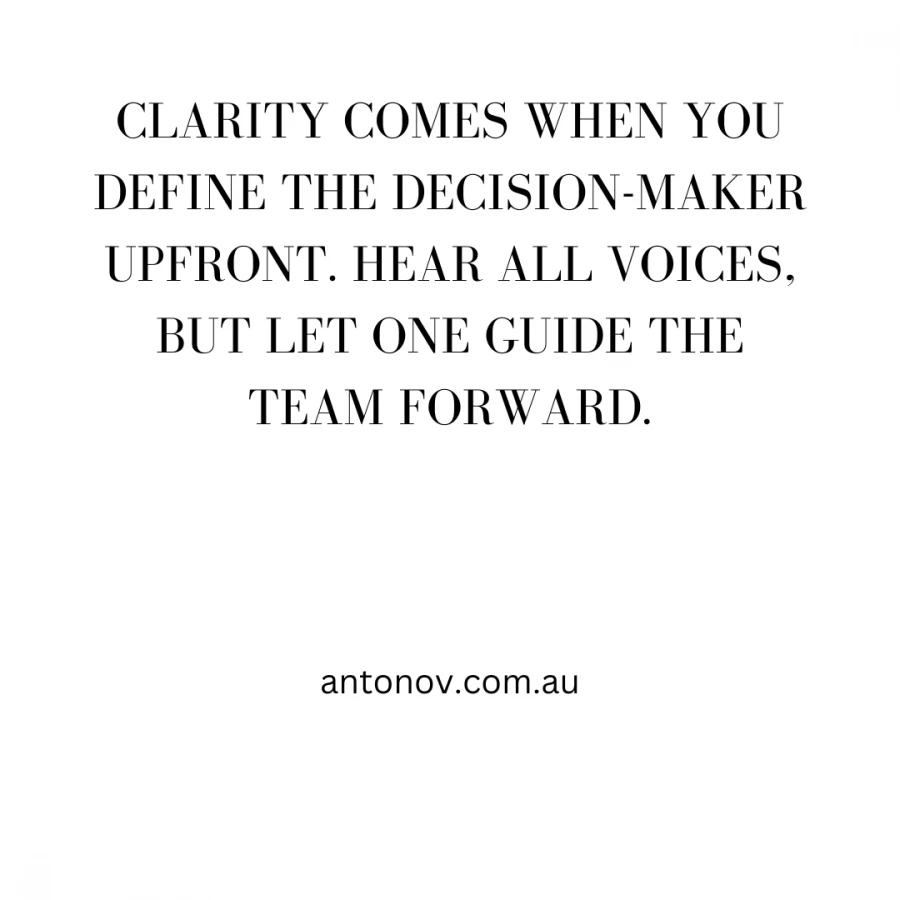
-
A short post about unstoppable teams.
-
All teams will face this moment sooner or later.
Torpedoes hit and chaos erupts. This feels like the end.
You see those who freeze and are lost in analysis or despair. Others grab buckets, extinguish fires and patch the holes. Those who can't handle the shitstorm often leave or, worse, switch off - but the team that stays learns.
Each crisis builds resilience and over time, the screams fade, the paralysis lessens and the team grows steady.
One day, the torpedo hits again but nobody panics. Everyone acts, shoulders the load and trusts each other to hold the line.
That's the moment you know your team is unstoppable.
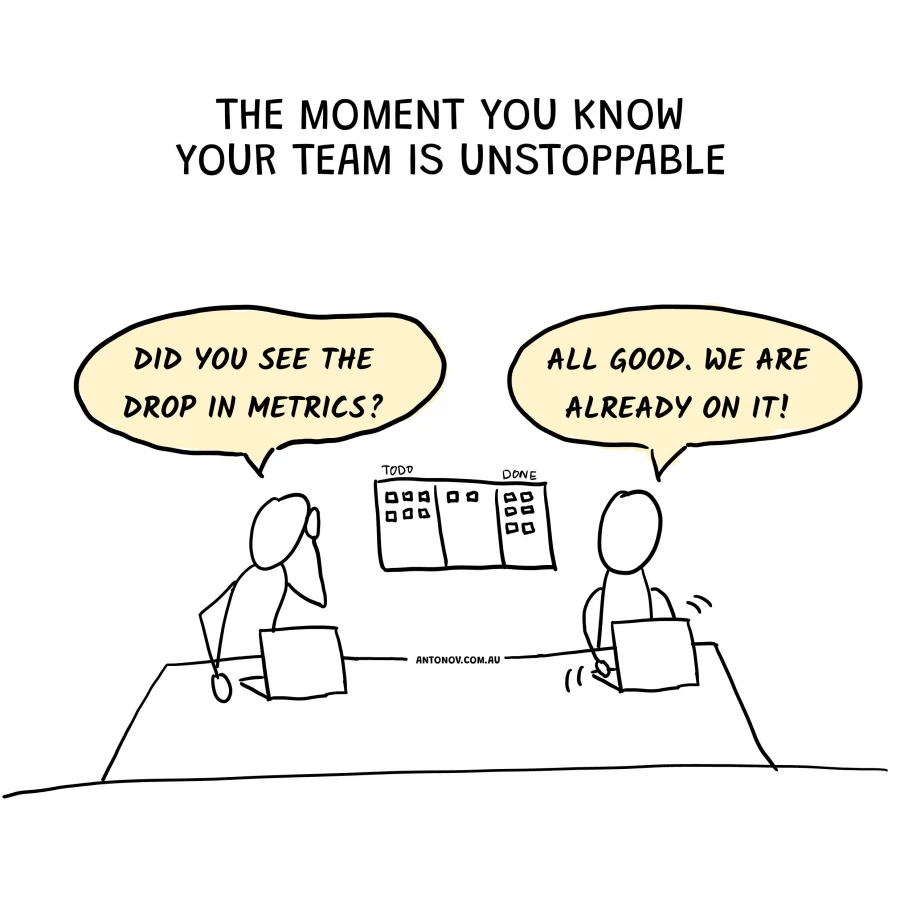
-
Working at a small tech business shapes your career differently.
You'll juggle strategy, customer service, product development and beyond. The small team demands versatility, immersing you in every aspect of the business. This hands-on experience accelerates learning and builds skills quicker than larger organisations ever could.
For ambitious minds craving growth and variety, nothing compares.
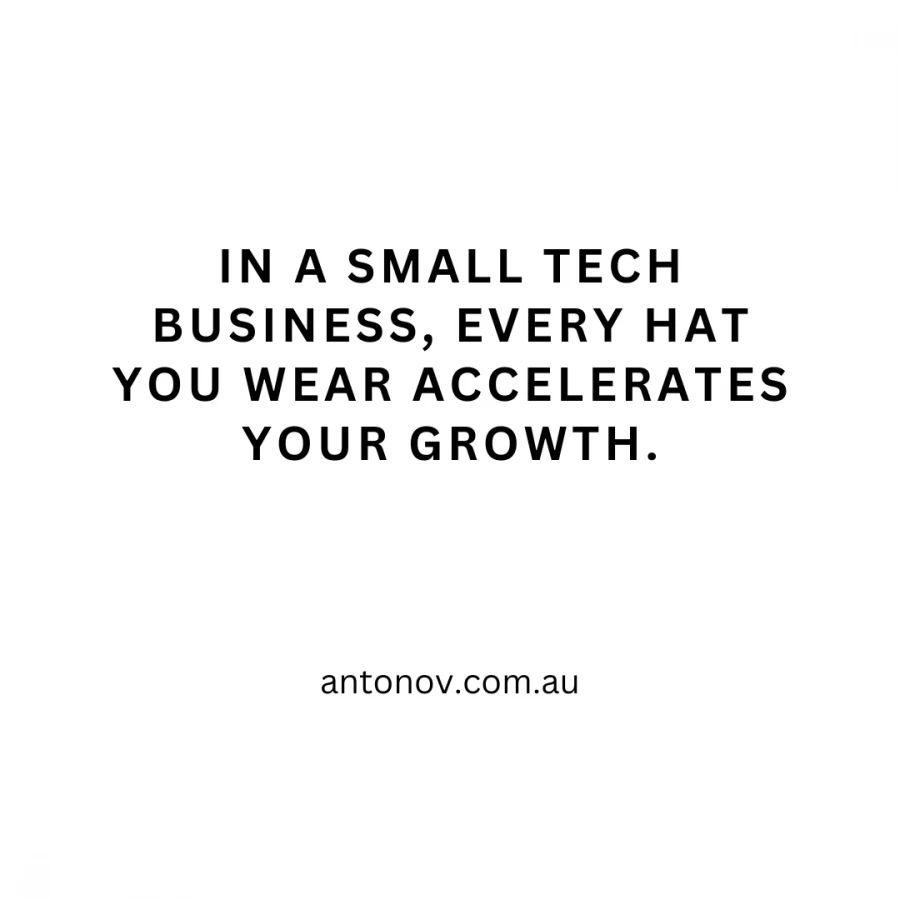
-
Building a Thinking Team Culture
When a product leader decides to forge a new feature or even build a new product it's a good idea to brief the team and draw a couple of diagrams on a whiteboard. What does your team do next though?
I... Read more
Feel free to reach out: [email protected].
